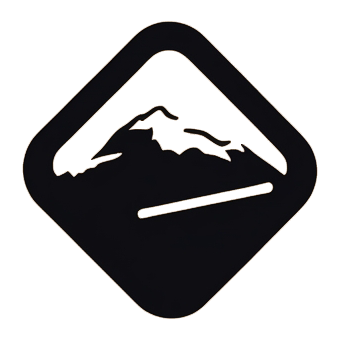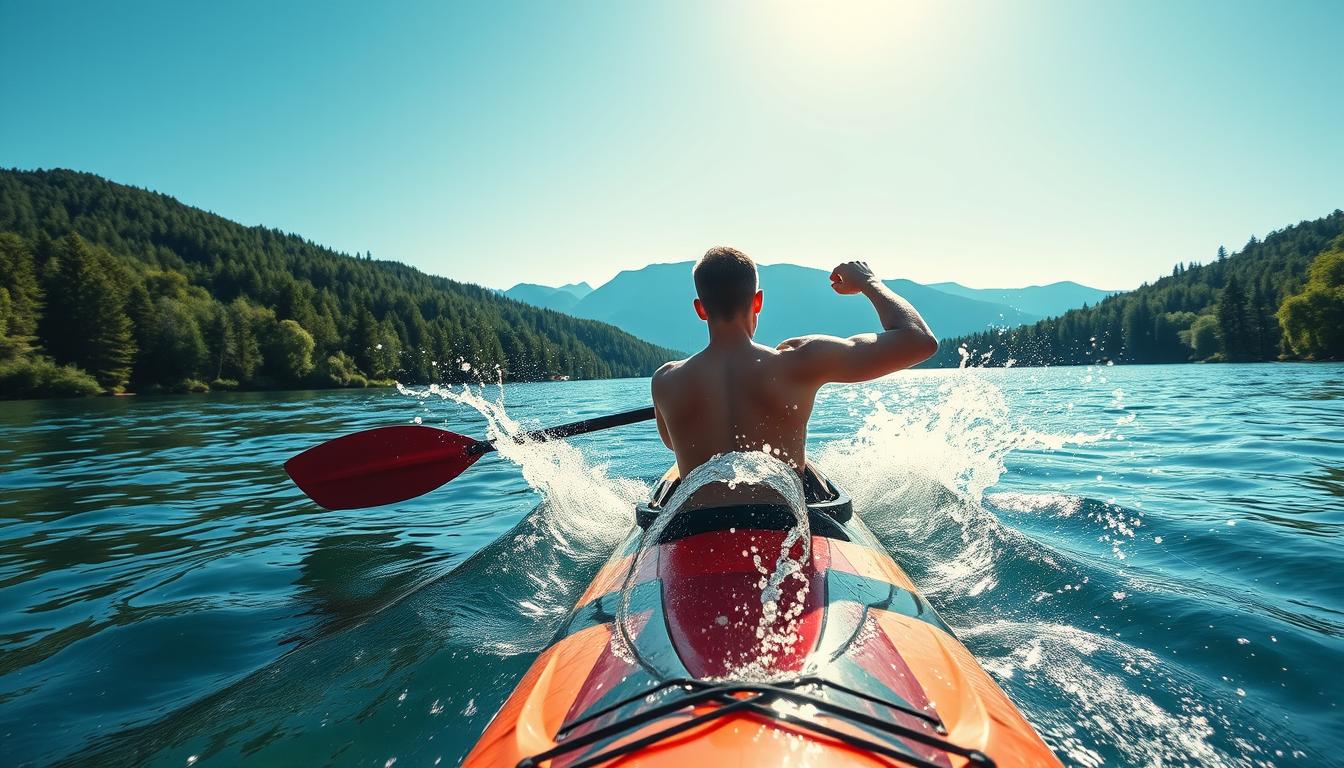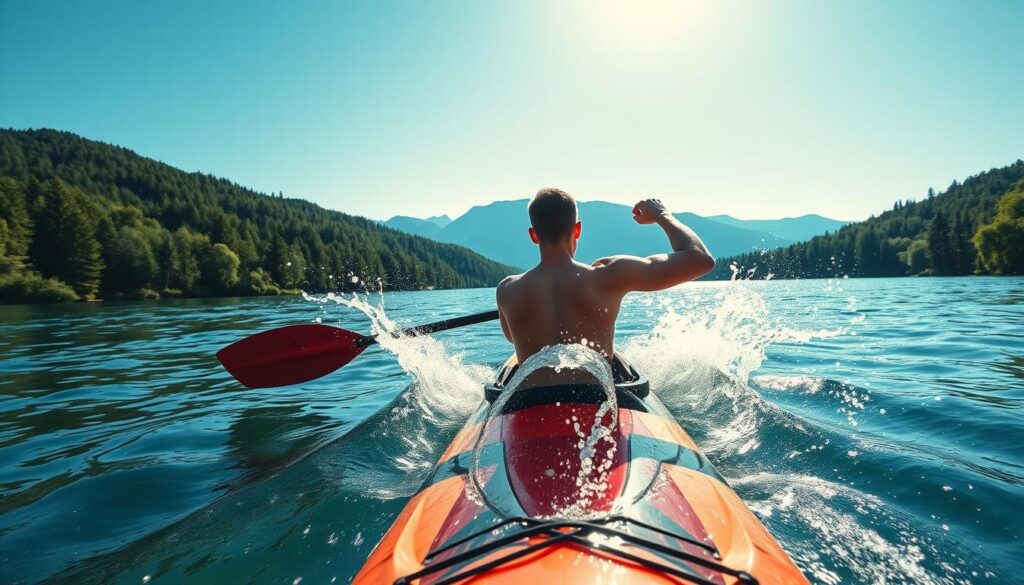
Imagine yourself moving smoothly over clear waters, paddle in hand, with stunning views all around. Kayaking is more than just an adventure. It’s a great way to burn calories and boost your fitness.
So, how many calories does kayaking burn? The answer might amaze you. You could burn 300 to 500 calories every hour, depending on how hard you paddle and your weight. It’s not just a workout; it’s a fun, full-body exercise that works your heart and muscles.
Kayaking is perfect for anyone who loves staying active and enjoying the outdoors. It’s a unique mix of physical challenge and fun. Plus, it’s a great alternative to going to the gym.
Key Takeaways
- Kayaking burns 300-500 calories per hour
- Provides full-body workout with low impact
- Combines fitness with outdoor exploration
- Engages multiple muscle groups simultaneously
- Offers cardiovascular and strength training benefits
Understanding the Basics of Kayaking as Exercise
Kayaking turns water fun into a great workout that burns lots of calories. Paddling is not just about seeing beautiful views. It’s also a workout that works many muscles at once.

Kayaking is a special way to get fit. It mixes heart-pumping activity with building muscle strength. How many calories you burn depends on how hard you paddle and your technique.
Types of Kayaking Movements and Muscle Groups
Each kayaking style works different muscles:
- Recreational kayaking: Works shoulders, arms, and back
- Sea kayaking: Focuses on core and legs
- Whitewater kayaking: Needs full-body effort
The Role of Core Engagement in Kayaking
Your core is key in burning calories while kayaking. Good paddling technique means keeping your core active. This:
- Keeps your body stable
- Increases calorie burn
- Better balance and posture
Understanding Metabolic Equivalent (MET) Values
MET values show how much energy kayaking uses. A moderate kayaking session is about 3-5 METs. This means you burn a lot of calories.
“Kayaking isn’t just a sport, it’s a full-body transformation waiting to happen.” – Professional Kayaking Instructor
Knowing these basics shows kayaking is more than fun. It’s a great way to stay fit and enjoy yourself.
How Many Calories Does Kayaking Burn Per Hour
Kayaking is a great workout that burns calories while you enjoy the water. The calories you burn kayaking depend on several factors. This makes each paddling session a unique fitness experience.
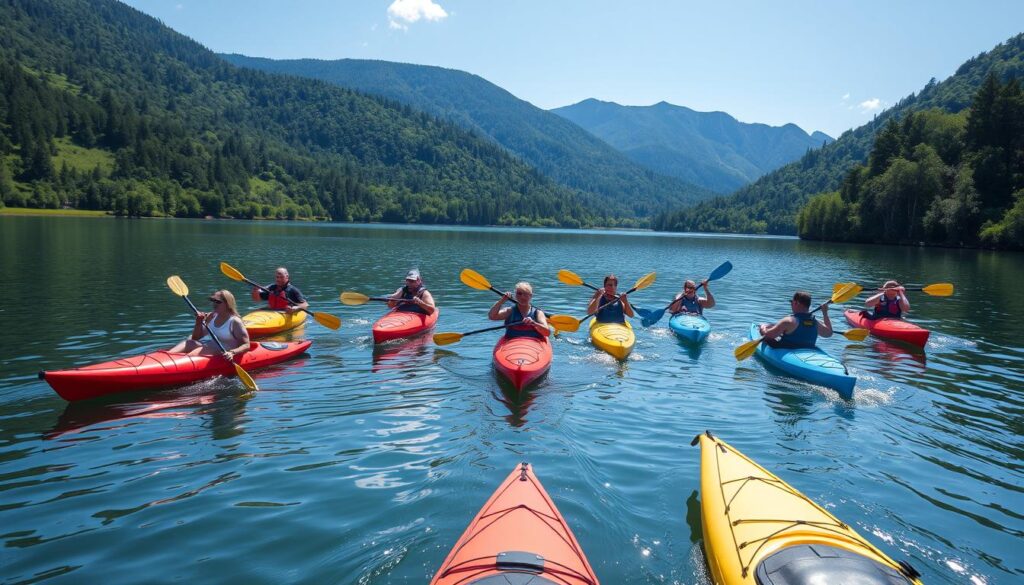
The calories burned from kayaking vary a lot. It depends on how hard you paddle and your personal characteristics. For a typical kayaker, you might burn:
- Gentle paddling: 300-400 calories per hour
- Moderate kayaking: 400-500 calories per hour
- Intense kayaking: 500-700 calories per hour
Professional kayakers and competitive paddlers can burn even more calories. They might reach up to 800 calories per hour during intense sessions.
“Kayaking isn’t just a scenic adventure – it’s a full-body workout that can help you burn significant calories while enjoying nature’s beauty.” – Fitness Expert
Your calorie burn from kayaking depends on several things. These include:
- Body weight
- Paddling intensity
- Water conditions
- Duration of your kayaking session
A 150-pound person can burn about 340-450 calories in an hour of kayaking. Heavier people will burn more calories doing the same activity.
Factors Affecting Calorie Burn While Kayaking
Kayaking isn’t the same for everyone. Many things affect how many calories you burn. Knowing these can help you get the most out of your kayak workout.
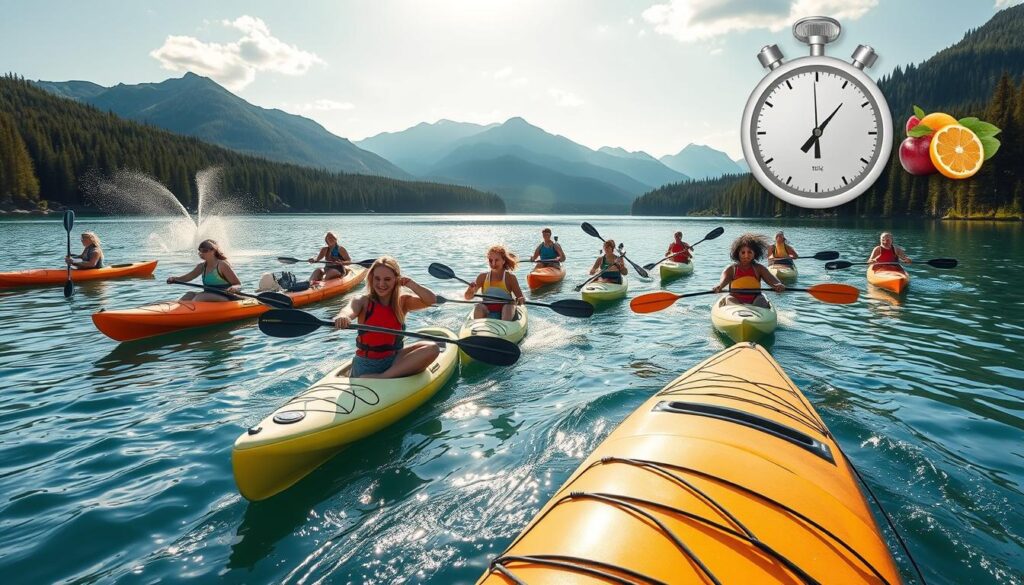
Water Conditions and Weather Impact
The place you kayak in matters a lot. Different waters and weather change how many calories you burn:
- Calm lakes need less effort than rough seas
- Strong winds make paddling harder, burning more calories
- Cold water makes your body work harder
Paddling Intensity and Technique
How you paddle affects your calorie burn. Using the right techniques can make your workout better:
- Strong, steady strokes burn more calories
- Interval training boosts your metabolism
- Good form saves energy
“The right technique turns kayaking into a tough full-body workout.” – Professional Kayaking Instructor
Body Weight and Composition
Your body type affects how many calories you burn. Heavier people usually burn more calories. Your muscle and fitness level also matter for burning calories while paddling.
Knowing these factors helps plan better kayak workouts. You can make your sessions more effective and fun.
Comparing Kayaking to Other Popular Workouts
Kayaking is a standout when it comes to burning calories. It’s a workout that challenges many muscles at once. This makes it a great choice for those looking to stay fit.
- Running (6 mph): About 600-750 calories per hour
- Cycling (moderate intensity): Around 500-600 calories per hour
- Swimming: Roughly 500-700 calories per hour
- Kayaking: About 400-500 calories per hour
Kayaking might burn fewer calories than some high-intensity workouts. But it has its own benefits. It’s low-impact, which is good for your joints. Plus, it’s a great way to burn energy.
“Kayaking engages your entire body, creating a holistic exercise experience that traditional workouts can’t match.” – Fitness Expert
How many calories you burn while kayaking depends on a few things. These include how hard you paddle, the water conditions, and your fitness level. The dynamic movement in kayaking works many muscle groups. This makes it a full-body workout.
Kayaking is a great option for those who want to mix up their workouts. It’s a fun way to get your heart rate up, build strength, and enjoy the outdoors all at once.
Tracking Your Kayaking Calorie Expenditure
Now, tracking your kayaking calorie burn is easier with modern tech. Whether you paddle casually or seriously, tracking your activity helps you see your fitness growth. It also lets you set goals that matter.
To accurately track your kayaking calorie burn, you need the right tools and methods. Many fitness trackers and mobile apps are out there. They give you detailed insights into your water workouts.
Best Fitness Trackers for Kayaking
Not all fitness trackers are good for water activities. Look for these important features in your kayaking calorie tracker:
- Waterproof rating of at least 5 ATM
- GPS tracking capabilities
- Heart rate monitoring
- Water-specific activity modes
Some top picks include the Garmin Fenix series and Apple Watch Ultra. They have strong water tracking features.
Using Mobile Apps for Calorie Tracking
Mobile apps can add more insights to your fitness tracker. Strava and MyFitnessPal are great for tracking kayaking calorie burn.
“The right tracking tool can transform your kayaking from a casual activity to a targeted fitness journey.” – Fitness Experts
When picking an app, think about these things:
- How accurate is the calorie calculation?
- Is the app easy to use?
- Does it work with other fitness platforms?
- Can you log specific kayaking details?
Pro tip: Make sure to enter your accurate body weight. Also, choose the right kayaking type (recreational, touring, or intense paddling) for the most accurate calorie burn estimate.
Maximizing Your Calorie Burn on the Water
To get the most out of kayaking, you need a plan and smart techniques. By using targeted training, you can burn more calories. This boosts your metabolism and challenges your body.
Here are some ways to increase the calories you burn while kayaking:
- Incorporate interval training during your paddling sessions
- Vary your paddling intensity to keep muscles guessing
- Select challenging water routes with different resistance levels
- Focus on proper paddling technique for maximum efficiency
Interval training turns a regular kayaking session into a tough workout. Mix short, intense paddling with rest periods. This method boosts calorie burn and improves heart health.
“Intensity is the key to unlocking your body’s full calorie-burning potential.” – Professional Kayaking Trainer
Your weight and paddling style affect how many calories you burn. Heavier paddlers burn more, but technique is key. Use your core, keep good posture, and move your whole body to burn more calories.
| Technique | Calorie Burn Impact | Difficulty Level |
|---|---|---|
| Interval Paddling | High | Moderate |
| Core Engagement | Medium | Easy |
| Route Variation | High | Challenging |
Consistent practice and slowly increasing intensity are key. They help you stay fit and burn more calories on your kayaking trips.
Health Benefits Beyond Calorie Burning
Kayaking is more than just burning calories. It offers many health benefits that improve both your body and mind.
Kayaking isn’t just about tracking calories. It’s a full wellness approach that boosts your physical and mental health.
Mental Health and Stress Relief
Paddling in calm waters can help reduce stress. Kayaking offers:
- Natural meditation in the outdoors
- Less anxiety with rhythmic movement
- Better mood from being in nature
- Clearer mind and focus
“Kayaking is not just exercise; it’s a form of moving meditation that reconnects you with yourself and the environment.” – Outdoor Fitness Magazine
Cardiovascular Improvements
Kayaking is great for your heart. It strengthens your heart, improves blood flow, and boosts endurance. Kayaking is low-impact, making it good for heart health.
Every stroke in kayaking helps your heart. It:
- Increases heart endurance
- Improves blood flow
- Reduces heart disease risk
- Boosts overall heart function
Remember, kayaking is more than a workout—it’s a comprehensive approach to maintaining your physical and mental well-being.
Conclusion
Kayaking is a great way to boost your fitness while enjoying the outdoors. The calories you burn can vary a lot. This depends on how hard you paddle, your technique, and your body weight.
Kayaking is more than just a workout. It works out many muscles and improves your health in many ways. By tracking your progress, you can make each paddle session count.
Kayaking is fun, whether you’re paddling on calm lakes or through rough river currents. It’s a great way to get fit and enjoy nature. You’ll see better heart health, stronger core, and burn lots of calories.
Start your kayaking fitness journey today. Invest in good gear and practice often. You’ll find it’s a fun way to stay fit, reduce stress, and enjoy nature while burning calories.
